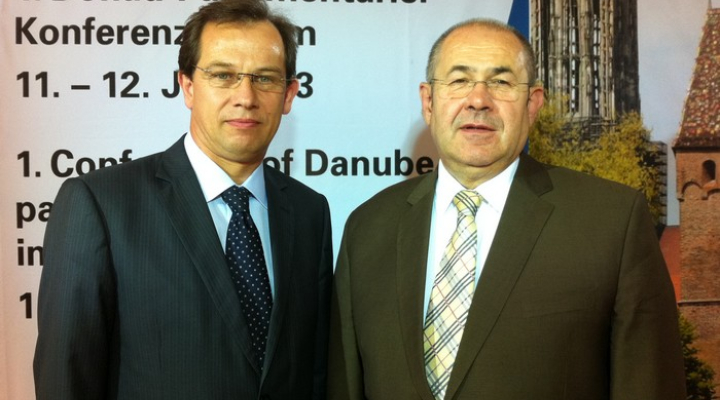Csaba Sógor, founding member of the Danube Research Network
As part of the EU Strategy for the Danube Region, the first Conference of the Danube Parliamentarians was held on 11-12 July 2013 in the German city of Ulm. Alongside 10 representatives from national parliaments at the meeting there were also two members of the European Parliament – Csaba Sógor and Michael Theruer. The Danube Research Network was also created on this occasion.
In 2011 the EU Strategy for the Danube Region gave a new push for the cooperation between states from the Danube Region. The cooperation is to be strengthened through the active participation of parliamentarians. As part of this process, the International Advisory Committee (IAC) also includes seven members of the European Parliament. This way, beside his colleagues from Austria, Germany, the Czech Republic, Slovakia, Hungary and Croatia, Csaba Sógor was also invited to the workings of the Committee. The IAC is composed of various experts from member states, whose task among others is to supervise projects, formulate proposals and support international cooperation.
The participants at the conference of parliamentarians adopted a final declaration of 11 points, point 4 of which foresees that the observance of human rights, the protection of ethnic, religious and sexual minorities are essential values for coexistence in the region. Additionally, point 9 establishes that financial resources must be used for further strengthening economic and social cohesion, promoting tourism, protecting the environment, combatting damage to the environment, preserving and encouraging mutual awareness of cultural values, reinforcing effective democratic structures, and for improving connections in the Danube Region.
Regarding the Danube Research Network, Csaba Sógor’s role as founding member is to support the integration of local universities in the project.
“In order to have a better cooperation in the field of economy, research and infrastructure, it is essential to change mentalities. We can only be efficient if we succeed to eliminate hate speech and false historical conceptions from education”, declared Csaba Sógor at the Conference of Parliamentarians.
The Danube Research Network encourages close cooperation between so-called convergent sciences (bio-, nano-, info- and cognitive studies). Any development centre or university from along the Danube or one of its effluents can sign up to the network. According to the Hungarian politician from Transylvania, the branch from Miercurea Ciuc of the Sapientia Hungarian University from Transylvania already expressed its wish to participate. “We hope that this programme will offer Hungarian universities from Transylvania the opportunity to develop through student and education staff exchanges and other research and education projects”, added Sógor.











